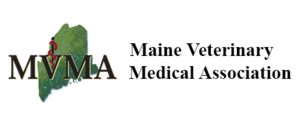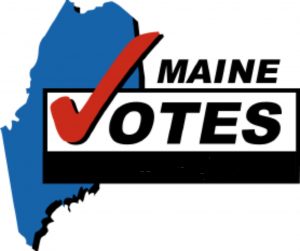Editor’s Note: Dr. Janelle Tirrell owns Third Coast Equine, a large animal veterinary practice based in Palermo, Maine. She is also the Legislative Committee Chair and a board member of the Maine Veterinary Medical Association. We welcome this guest column.
Dr. Tirrell writes:
This fall, Mainers will weigh in on several ballot initiatives. Some of them have grabbed the attention of big money, and hence we are inundated with messages of support and opposition. Question 3 is not one of the glitzy, big money initiatives; it has slipped in quietly, and is shrouded in innocuous feel-good language, but its repercussions are far reaching.
 Question 3 asks Mainers to support a constitutional amendment that would preempt all local and state ordinances pertaining to animal cruelty, zoning, and food safety in the name of the “Right to Food.” The Maine Veterinary Medical Association [MVMA] is opposed to Question 3.
Question 3 asks Mainers to support a constitutional amendment that would preempt all local and state ordinances pertaining to animal cruelty, zoning, and food safety in the name of the “Right to Food.” The Maine Veterinary Medical Association [MVMA] is opposed to Question 3.
As stewards of public health, animal welfare, and food safety, we are deeply concerned about the vague, overly broad language used in Maine’s “Right to Food” constitutional amendment. The language on the ballot asks the question “Do you favor amending the Constitution of Maine to declare that all individuals have a natural, inherent and unalienable right to grow, raise, harvest, produce and consume the food of their own choosing for their own nourishment, sustenance, bodily health and well-being?” Hidden in that is the right of any individual to raise, shelter and harvest any animal in any manner and under any conditions he or she wishes. Further, it does not implement any effort to address food insecurity or nutritional inequities. It solves no problem, while creating many.
Maine has good animal cruelty laws while also reaping the rewards from scores of small farms and local producers from which we can buy local eggs, meat, milk, fruits, vegetables, and cheese. A tradition of local agriculture in tandem with a commitment to the welfare of animals on those farms contributes greatly to our quality of life.

Dr. Janelle Tirrell
Animal cruelty laws protect the welfare of animals by providing a standard for animal housing, nutritional needs, husbandry practices, and veterinary care. Food safety laws ensure that the food we buy meets rigorous standards that protect consumers from food-borne illnesses and diseased products. Question 3 does NOT provide an exception to maintain these hard-fought victories and their enforcement, and preempts and vacates animal cruelty and food safety laws. All manner of cruelties, in ANY species, could be beyond the reach of the law by hiding behind the curtain of “food production.”
MVMA recognizes the laudable goals of Question 3 — though it does nothing to address food insecurity — and we do agree that individuals should have power and control over their food choices. We also believe that the prevention of animal suffering, safe food production, and humane harvest of animals and animal products are vital considerations that should be included in proposed law change.
 Consequently, we oppose the “Right to Food” amendment and strongly urge Mainers to vote NO on Question 3.
Consequently, we oppose the “Right to Food” amendment and strongly urge Mainers to vote NO on Question 3.
Janelle D. Tirrell, DVM
Board Member, Maine Veterinary Medical Association
I am in support of Dr. Tirrell’s opinion. We have gained so much in Maine by having enlightened animal welfare regulations and approaches, with much more attention being paid to how animals are raised and treated, whether pets or production animals for agriculture. We have a thriving artisanal food culture already, with things like licensing options for producers of raw milk products. Let’s keep on track and let’s vote no on Question 3.
I’m not sure how these hate filled questions get on our ballots. Voting NO and alerting everyone I can! Thank you!
Thanks for the explanation Dr Tirrell. Definitely I will be voting NO. This is quite a deceptive referendum question
Hoping you can clear things up….how is adding this language to the constitution negating animal cruelty laws already in place? Are you saying the amendment should include language about the safety and care of all animals and thus a no vote is best for now until there is better language? I just came across this question last night so i have no guidance on it. Trying to gather all details. I’m concerned about the hidden implications of both yes and no votes.
This constitutional amendment as written provides an affirmative defense, i.e. “Yes, I know these pigs are crammed in cheek by jowl, but I’m raising them for food and that’s constitutionally protected.” Same with zoning, trading seed potatoes outside of regulated monitored pathways, or dropping your lobster trap whenever you please. Might these things be sorted out in the courts? Yes, but not before damage is done…. To animals, to crops, to livelihoods.
Further, these newly protected freedoms don’t address food insecurity in any way.
This is not a food security bill…. It’s food anarchy. Especially in the short run, where so many animals live their lives.
Passing this also does not negate current laws in effect. I feel this article is doing more harm than good with understanding the question. People should have the right to obtain food wherever and however they so choose. There are current animal welfare laws and licensing laws for food production amd sales. This is primarily so the government cannot prohibit an individual’s choice to produce their own food. With the crazy actions of government entities regarding other rights, I feel there is a need to do preventative work to ensure these rights.
Passing this DOES have the ability to negatively impact existing state laws and local ordinances. Constitutional law has the ability to preempt state laws and local regulations. This problem was brought up at the public hearing by many. Language that would have corrected this issue while maintaining the intent of the amendment was proposed but ignored. I could support this is the language was more specific, but cannot support as it is currently written.
Thank you, Dr. Tirrell, for so eloquently explaining the risks to all farm animals in Maine, and to food safety in production. Most folks who think there may be a government plot to inhibit our right to grow our own food may not have had the benefit of reading or reviewing the broad opposition to this amendment when it was presented for review in the committee for Agriculture, Conservation and Forestry. When everyone understands fully the implications of the language contained ( and missing) in this empty gesture, the fact that it provides no solutions to any existing problem, and will confound efforts to enforce existing animal welfare standards in food production and food safety, then perhaps folks will understand this amendment has no value to us as a society in Maine. Additionally, we already have excellent laws allowing for the right to produce, grow and distribute our own foods already in Maine. This unnecessary gesture, once again, belongs in the waste bin of misguided and misleading public policy/issues.
This is paranoia gone wild. If there were right to produce, more people would, thus more food, less hunger.
I’ve met tons of new young farmers and they all were caring and compassionate folks. There are laws for the rare sycopath. Gezz, get a grip.
The law specifically prohibits abuse of natural resources, and an animal that is for food is clearly a natural resource rather than a pet, so I think you don’t need to worry. Certainly more people would be decent to the animals they raise than those than the situation now with factory “farms”, which is the source for the vast majority of animal products sold in stores. Very few people are that cruel, which is why there is so much resistance to showing photos of those conditions. Yes, obviously some people are that cruel, otherwise these places wouldn’t exist. But most people who want to be responsible for their own food are, in a word, responsible.